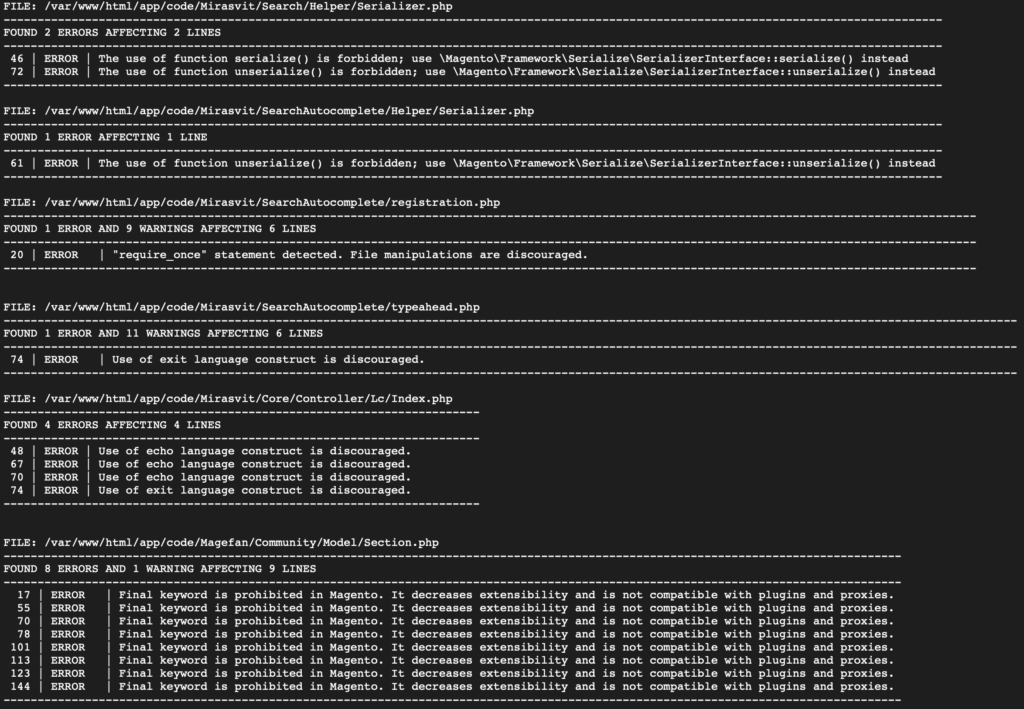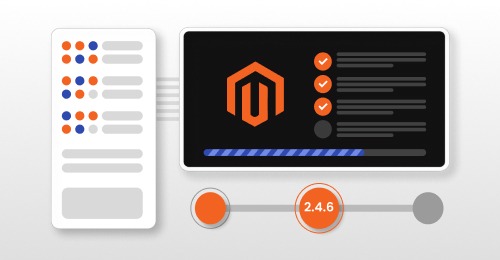Just like a vehicle requires regular servicing to function smoothly, your Magento e-commerce website needs regular code audits to operate at its best. Occasionally, your site may face issues, such as bugs, crashes, or slow loading speeds. Aside from that, if you are launching a new Magento store, you may want to prevent potential performance troubles. A competent Magento code audit intends to help you in both cases.
WebMeridian specializes in Magento software, and our experience in the code audit services is tremendous. We know how to fulfill a thorough inspection of your online shop’s codebase and guarantee its optimal operation.
The Magento site audit comprises checking several store operation areas and determining which of them need upgrading. Certified Magento developers comprehensively review every code line and reveal potential weaknesses, troubles, and areas for upgrade. We usually target the following aspects:
- Website build quality,
- Used coding practices,
- Safety,
- The general site’s health.
According to our experience, you should perform a Magento 2 code audit one to two times annually or in case of performance hindrances. In this article, we will share our practices and recommendations regarding Magento code review, familiarize you with the procedure and its pitfalls, and explain the upsides of Magento code audit by certified Magento developers.
- What is a Magento Code Audit?
- Magento Code Audit: Q&A Session with an Adobe Certified Developer
- How Much Does a Magento Audit Cost?
- When Do You Need a Magento Code Audit Service?
- Magento Technical Audit: Complete Checklist
- During the Technical Magento 2 Code Audit, We Review the Following
- What Will You Get with a Magento Code Audit Service?
- How Does the Magento 2 Code Audit Service Work by WebMeridian?
- What Accesses Should The Site Owner Provide To Us To Conduct a Magento Technical Audit?
- Who Conducts A Magento Technical Audit?
- The Tools We Use For Magento Code Audit
- Conclusion
Get A Magento Expert Consultation
Our Adobe Business Practitioner conducts site audit to optimize your eCommerce weaknesses.

What is a Magento Code Audit?
A Magento code audit is an extensive inspection of a site’s codebase to assess its quality, safety, operation, and compliance with best practices. It encompasses analyzing the source code, extensions, and configurations to detect concerns, weaknesses, and opportunities for upgrading. The Magento technical audit helps guarantee the site’s reliability, scalability, and correspondence to Magento’s standards, facilitating a delightful user path and a more robust online shop.
The Magento code audit service is typically performed by certified Magento 2 developers who prepare a comprehensive report on the code quality of your webstore, potential security gaps, functional complications, and operation obstacles.
Ultimately, this information empowers you to fix the existing issues, prevent potential troubles, and enhance your site’s codebase to achieve resilient performance.
Magento 2 code audits often include a thorough examination of the following elements:
- Magento core,
- Third-party code,
- Database.
Magento Core
Magento’s architecture adheres to the modularity idea, which allows developers to introduce new capabilities and override existing ones in the platform without modifying its core code. This helps to safeguard the code’s integrity and promotes development processes.
Even so, unskilled developers and those new to the platform may prefer to change the core code rather than write extensions to override the inherent modules. A comprehensive audit of Magento’s core code aids in the identification of issue areas and the avoidance of downtime during future platform updates.
Third-party Code
Using poorly constructed Magento extensions might lead to website performance difficulties. Even if you use extensions from reputable developers, utilizing too many or ones that are incompatible with each other will dramatically slow down your page load time.
Adobe strongly advises developers to adhere to the Magento code standard while creating extensions to maintain consistency and preserve best practices. A thorough audit of your website’s custom code and third-party extensions will assist in identifying issues such as poorly written JavaScript, excessive requests, and other variables that might negatively affect website usability.
Database
Although the database in Magento is rarely the bottleneck in website speed, it cannot be counted out. The site database might get bloated and start underperforming, especially in older sites that have been functioning without maintenance for years.
A database audit aids in the detection of current issues by assessing important performance indicators and discovering typical security flaws such as rogue user rights. Once found, you may put steps in place to make the database faster and more secure.
Magento Code Audit: Q&A Session with an Adobe Certified Developer
Adobe Certified Professional, Magento 2 developer with 8+ years of software development experience, answered 10 questions about the Magento code audit process, deliverables, and nuances. Our expert, Pablo Poberezhnyi, has worked on many different projects, ranging from small parsers and SPA development to highload with a load of 10,000 clients per day. He has worked with e-banking, e-shops, and web-scrapers.
Q1: Why does an eCommerce business owner need a Magento code audit?
A1: I have developed Magento for ten years, and I can attest to the value of a technical audit for multiple reasons. Here are some key points to consider:
- Poor Usability Equals High Exit Rates: A Magento code audit identifies usability issues that can frustrate users and lead to a high exit rate. By addressing these issues, you can create a more seamless and enjoyable user experience.
- Low Page Loading Speed Equals High Bounce Rates: Magento technical audit helps pinpoint performance bottlenecks, allowing you to optimize page load times and keep visitors engaged.
- Fixing Issues Found in the Audit Leads to:
- Customer Satisfaction: By improving usability and performance, you enhance the overall shopping experience.
- Completed Purchases: A smoother and faster website increases the likelihood of visitors completing their purchases.
- Brand Reputation: A well-functioning, efficient website enhances your brand’s reputation, encouraging repeat business and positive word-of-mouth.
Q2: What is the process of a Magento audit?
A2: The process of a Magento audit is thorough and multifaceted, covering both frontend and backend aspects to ensure your site operates at its best. Here’s a detailed breakdown of the Magento technical audit at WebMeridian:
Frontend Audit
- Image Optimization: We evaluate the images on your site to ensure they are optimized, which directly affects load times.
- Render Blocking Assets: We identify and address assets that block the rendering of your site, improving the load speed and user experience.
- Content Layout Shifts: We assess and minimize unexpected layout shifts that can disrupt the user experience.
- UI/UX Review: Our Magento audit experts review the user interface and user experience to ensure the site is user-friendly and intuitive.
- Frontend Performance Audit: We conduct a comprehensive audit of the frontend performance, including load times and responsiveness.
- Page Speed Testing: We test the page speed across various devices and browsers to identify any performance bottlenecks.
- JS/CSS/HTML Review: We review the JavaScript, CSS, and HTML code to ensure it is clean, efficient, and free of errors.
Backend Audit
- Bugs and Glitches: We identify and fix bugs and glitches that can affect the functionality and performance of your site.
- Pure Quality Code: Our code base audit ensures that your code is clean, efficient, and maintainable.
- Server and Application Configuration: We review and optimize the server and application configuration, including Varnish, PHP, MySQL, and other essential components.
This comprehensive Magento technical audit process is crucial for identifying issues that may be impacting your site’s performance and user experience.
Q3: What tools are used for a Magento code audit?
A: In a Magento code audit, we utilize a variety of specialized tools to ensure your codebase meets the highest standards of quality and performance. Here are some of the primary tools WebMeridian’s experts use:
- PHP_CodeSniffer/Magento Coding Standard (phpcs): This tool helps in detecting violations of coding standards.
- PHP Code Beautifier and Fixer (phpcbf): This tool automatically fixes coding standard violations detected by PHP_CodeSniffer, helping to keep your code clean and well-formatted.
- PHP Static Analysis Tool (phpstan): PHPStan performs static analysis of your PHP code, identifying potential errors and bugs without executing the code.
- PHP Mess Detector (PHPMD): PHPMD identifies code that is potentially problematic, such as unused variables, functions, and complex expressions.
Example of response:

Additionally, we also recommend:
5. SonarLint: This is a free IDE extension that provides on-the-fly feedback to developers about potential issues in their code. It helps in maintaining code quality and consistency directly within the development environment.
Q4: What are the different types of Magento code audits, and how long does each stage typically take?
A4: Magento code audit types include frontend, backend (code and database), SEO, and security audits, with durations ranging from one day to one to two weeks to meet the project’s specific needs.
Q5: Is it necessary to conduct all types of audits, including manual, front-end, back-end, security audit, and infrastructure review?
A5: While performing a comprehensive audit covering all aspects is beneficial, we tailor our approach based on specific needs. Depending on the objectives—enhancing stability, improving speed, or boosting conversions—we prioritize audits accordingly, ensuring optimal results aligned with your goals.
Q6: Who conducts the audit—one developer or a team of specialists?
A6: The audit team’s makeup varies depending on the type of audit, project size, and client preferences. For optimal results, different specialists, including backend developers, frontend developers, SEO specialists, and DevOps professionals, handle specific aspects of the audit, ensuring comprehensive coverage and in-depth analysis.
Q7: What mistakes are most often found during an audit? What would you advise all page readers to pay attention to?
A7: Based on my experience with Magento code audits, common issues include insecure calls to the database, incorrect implementations, and low-quality extensions. I advise all readers to pay close attention to these aspects during their website optimization and Magento code audit to ensure optimal store performance and security.
Optimize Your Website Properly
Gain valuable insights and recommendations through our comprehensive Magento code audit services. Discover potential areas for improvement and enhance your website's performance with our expert guidance.

Q8: How often should you conduct a code audit?
A8: Generally, I advise conducting a Magento code audit once every 6 months to a year. For ongoing projects, conducting at least one code audit during the project’s lifetime is essential.
Q9: What tools are used for audits?
A9: During the audit, the dev team typically utilizes specialized coding standard tools and various maintenance tools to ensure thorough analysis and assessment.
Q10: How are the audit results presented, and what are the deliverables?
A10: Depending on the customer’s preferences, the audit results are presented in various ways. Usually, documented findings are included for collaboration and reference. Additional formats, such as presentations or video conferences, can be arranged upon request to accommodate individual preferences.
Magento Audit: Time Estimates, Executing Parties, and Costs
At WebMeridian, we categorize Magento audits into two main areas: technical audit and SEO audit.
- Technical Audit includes a comprehensive review of UI/UX, frontend performance, JavaScript/CSS/HTML, codebase quality, and server and application configuration.
- SEO Audit focus on identifying errors that negatively impact the online store’s ranking and visibility on search engines like Google, Bing, and Yahoo.
Together, these complementary stages form a holistic approach to ensuring your Magento store operates at peak efficiency, both technically and in terms of search engine optimization.
| Types of Magento Audit | Specialist | Estimate, hours |
|---|---|---|
| Technical audit | ||
| Backend Developer | 10-16 | |
| Frontend Developer | 2-8 | |
| QA Specialist | 8-16 | |
| Poject Manager | 6-12 | |
| SEO audit | ||
| SEO Specialist | 2-3 | |
| SEO Specialist | 16-20 | |
Begin eCommerce Website Optimization
The structure of a website is akin to the foundation of a house. Lay a solid groundwork for your business's growth with a properly configured store.

How Much Does a Magento Audit Cost?
The table above provided an understanding of the time estimates for conducting a Magento audit and introduced the key participants in this process. Now, let’s delve into the financial aspects.
- Starting with the most pleasant offering, WebMeridian provides a free eCommerce SEO audit. This service includes an analysis of the website based on more than 70 parameters, a report on the primary errors, and brief recommendations for their elimination.
- For a more comprehensive evaluation, a detailed eCommerce SEO audit costs an average of $600 and covers over 130 parameters, complete with a detailed report outlining problems and recommendations.
- A technical audit, which involves a backend developer, frontend developer, QA, and PM, ranges from $1000 to $2000, depending on the project’s size.
| Type of Magento Audit | Costs, $ |
|---|---|
| Free Ecommerce SEO audit | 0 |
| Detailed Ecommerce SEO | ≈600 |
| Technical audit | 1000-2000 |
Free Magento SEO Audit
Don't let low site speed, lower conversion rates, and lost customers hold you back. Receive a complimentary audit report and recommendations from WebMeridian experts.

When Do You Need a Magento Code Audit Service?
Your Magento platform is a complex entity that functions on codes. All the visible front-end functionality is backed by the respective codes in the back-end to maintain your site operation. It is also complemented by multiple extensions modified for your needs, which makes the whole structure even more complicated. The codes and the extensions work as the bricks your store is made of. If any brick gets damaged, the entire website construction can be cracked or ruined.
You can start experiencing minor malfunctions, while neglecting them may lead to larger troubles in the long run. Therefore, we will share several signs that witness the necessity for a Magento audit. Our experience dictates that even if you encounter only one of these concerns, you should take measures, thereby avoiding considerable damage in the future.
- The site is slow. A sluggish operation may occur occasionally or continually. In any case, it should warn you of potential code issues. A slow operating speed can stem from inefficient or poorly optimized code. A code audit, in turn, can detect performance barriers and advise on elevating speed and responsiveness.
- New bugs emerge. Bugs can crawl from minor code flaws, causing user frustration. The emergence of new bugs often indicates underlying code blunders. An audit helps pinpoint and combat these bugs, preventing them from recurring.
- Unstable progression. The website development or creation of new features becomes disrupted or inconsistent due to persisting issues occurring on one or the other website’s part. A code audit reveals the core fault and can deliver solutions to ensure smoother development and deployment.
- The website is unstable. Frequent site crashes or downtime for no obvious reason can also be signs of code imperfections. By inspecting the code, an expert can reveal and rectify the code problems responsible for this instability.
- The suspicion of low-quality extensions. Poor-quality or incompatible extensions can adversely affect your site’s function and safety. An audit can evaluate the extensions utilized and advise improvements or replacements.
- Concerns about incompetent theme implementation. If the website’s design or theme hasn’t been implemented correctly, it can lead to usability issues and a discouraging consumer experience. An audit can assess the theme’s integration and functionality, guaranteeing its accurate application.
- Security weaknesses. If you suspect weaknesses or have experienced security breaches, an audit helps detect and remove potential gaps in your codebase.
- Compromised Magento installation. If you have reasons to consider your Magento setup faulty, a code audit will help you uncover vulnerabilities, eliminate malicious code, and avoid security breaches.
- Post-migration verification. It makes sense to fulfill an audit after migrating to a new Magento version or hosting environment. In these cases, a code audit validates that the code operates appropriately in the new setup.
- Continuous improvement. Regular Adobe Commerce & Magento code audits help maintain code quality, optimize operation, and guarantee security compliance as your site evolves.
Magento Technical Audit: Complete Checklist
Technical audit is an integral part of SEO, conducted at the project launch stage, after significant technical changes on the site (adding new functionality, updating the Magento version, configuring new Magento extensions, etc.). We also recommend conducting a Magento technical audit as a preventive measure 1-2 times a year. Another recommendation is to order a Technical Audit from different providers. Each team or company has its own set of tools and approaches to conducting a website code audit, and this approach allows you to identify the maximum number of technical errors. Conversely, some identified errors can be questioned, as you will have the opportunity to consult with multiple teams.
Below, we have prepared the main steps of a Magento 2 technical audit (more than 40 steps) to help you identify errors in the code and structure of your Magento website, as well as to uncover security vulnerabilities.
| Description | Best Tools | Issues | |
|---|---|---|---|
| Server Configuration and Performance | |||
| Check server hardware and software specifications | Server meets the recommended technical specifications for Magento | Yes/No | |
| Verify server load and response time | Server has stable load levels and quick response times | Pingdom, Apache JMeter, GTmetrix | Yes/No |
| Analyze server logs for errors and warnings | Detected server codes 4XX, 5XX, SSL/TLS Errors, Timeout Errors, etc. | Yes/No | |
| Ensure server security patches and updates are applied | All latest updates and security patches are installed | Yes/No | |
| Evaluate server resource usage (CPU, memory, disk space) | Server resource usage (CPU, memory, disk space) is within acceptable limits | Yes/No | |
| Magento Security | |||
| Verify Magento version and updates | Using the latest version of Magento with all updates applied | Yes/No | |
| Check for any Magento patches and security updates | All available patches and security updates are installed. Not configured Security Extensions | Yes/No | |
| Security certificate expires soon | When your security certificate expires, visitors will see a "not secure" warning, potentially reducing trust and traffic. | SE Ranking, Website Security Validator (ImmuniWeb) | Yes/No |
| Outdated security protocol version | Using an outdated SSL or TLS protocol (version 1.0) can compromise website data security. | SE Ranking, Website Security Validator (ImmuniWeb) | Yes/No |
| Certificate name mismatch | If the SSL certificate name doesn't match the address bar, visitors will see a "not secure" warning, leading to potential loss of trust and traffic. | SE Ranking, Website Security Validator (ImmuniWeb) | Yes/No |
| Outdated encryption algorithm | Outdated encryption algorithms can cause browsers to warn visitors of insecure content, leading to a loss of trust and traffic. | SE Ranking, Website Security Validator (ImmuniWeb) | Yes/No |
| HTTP URLs in XML sitemap | Transfer your site to HTTPS if it's using HTTP, and ensure HTTPS URLs are in the XML sitemap if already using HTTPS. | SE Ranking | Yes/No |
| No HTTPS encryption | HTTP is outdated and lacks encryption, causing modern browsers to tag HTTP sites as not secure, leading to a loss of visitor trust. | SE Ranking | Yes/No |
| rel="canonical" from HTTPS to HTTP | The rel="canonical" attribute on some HTTPS pages points to HTTP versions, which are unsafe and affect search engine ranking; move all pages to HTTPS. | SE Ranking | Yes/No |
| Redirect from HTTPS to HTTP | Redirecting HTTPS pages to HTTP makes the site insecure, risking data interception and affecting search engine ranking. | Yes/No | |
| Web Application Firewall (WAF) | Not configured WAR to protect your site from common web threats such as SQL injection, XSS, and DDoS attacks | Yes/No | |
| Automated Backups | Not configured backups. | Yes/No | |
| Secure Admin Panel (2FA) | Not configured Two-Factor Authentication (2FA) | Yes/No | |
| Code Quality and Standards | |||
| Review code for adherence to Magento coding standards | Code adheres to Magento coding standards | PHP CodeSniffer, Magento ECG (Expert Consulting Group) Coding Standard | Yes/No |
| Check for deprecated code and functions | No deprecated code or functions found | PHP CodeSniffer, Magento ECG (Expert Consulting Group) Coding Standard | Yes/No |
| Analyze custom modules and extensions for best practices | Custom modules and extensions follow best practices | Yes/No | |
| Conduct static code analysis | Static code analysis conducted, and errors corrected | Yes/No | |
| Database Optimization | |||
| Check database configuration and settings | Database configuration and settings are reviewed and optimized | phpMyAdmin, MySQLTuner | Yes/No |
| Analyze database performance and query efficiency | Database performance and query efficiency meet requirements | phpMyAdmin, MySQLTuner | Yes/No |
| Review and optimize database indexes | Database indexes are optimized | phpMyAdmin, MySQLTuner | Yes/No |
| Clean up old and unused data | Old and unused data removed | phpMyAdmin, MySQLTuner | Yes/No |
| Technical SEO | |||
| XML sitemap | Detected Non-canonical pages/Noindex pages in XML sitemap. | XML Sitemap Validator, SE Ranking | Yes/No |
| Robots.txt | Detected in Robots.txt file: Missing link to XML sitemap in robots.txt file Missing or incorrect attributes in User-agent, Disallow/Allow | Google Search Console (robots.txt report), SE Ranking | Yes/No |
| Search Engine Friendly URLs | URLs have an unclear format, containing uppercase letters, numbers, symbols (?, #, …) | SEO Friendly URL Checker | Yes/No |
| Canonical URLs | Missing or incorrect Canonical attribute, which indicates the main version of the URL to search engines | Canonical Tag Checker | Yes/No |
| Website Speed | Slow page loading: Images and media files are optimized Caching mechanisms (full-page cache, Varnish, Redis) are configured JavaScript and CSS files are optimized CDN is configured and working correctly | PageSpeed Insights, GTmetrix | Yes/No |
| No http/www/index.html/Uppercase URL Characters redirect | Automatic 301 redirect rules are not configured | SE Ranking | Yes/No |
| Categories, subcategories in the index | All categories and subcategories are accessible in search | Google Search Console | Yes/No |
| Internal links, orphan pages (pages without internal links) | Detected pages with no internal links | Google Search Console (Links report), | Yes/No |
| Hreflang (multi language website) | Hreflang attributes are incorrect or missing | Hreflang Tag Checker | Yes/No |
| Structured data markup | Structured data markup on the website pages (Product, Review, Ratings, WebSite, VideoObject) contains errors or is missing | Schema Markup Testing Tool | Yes/No |
| Self-referencing link | Detected pages with self-referencing links | ||
| Content | |||
| HTML meta tag | Detected duplicates in meta tags, empty fields, and errors in filling out | SE Ranking, Screaming Frog | Yes/No |
| H1-H2 header tags | Detected duplicates in H1-H2 headings, empty fields, and errors in filling out | SE Ranking, Screaming Frog | Yes/No |
| Unique content in categories, subcategories. AI-generated content. | Detected non-unique, AI-generated content | Plagiarism Checker by Grammarly, Duplichecker | Yes/No |
Don’t Settle For Less Than Adobe Certified Magento Team
Need developers here and now? We reply within 24h of business days to start solving your Magento needs ASAP. No bugs, no delays, no hidden fees – only respect, expertise and top-performance.

- Magento Configuration review / Indexing / Caching;
- Overall Code review / Core Code Changes / Log Files / Custom module structure compliance to Magento standards;
- JS code review;
- CSS code review;
- Used extensions review / reliability / structure compliance;
- Cross-browser testing;
- Overall Performance review / minification / merging / loading of product collection;
- Security review / Magento Security Patches;
- Server side configuration review / file permissions / cron jobs;
- SEO;
- Conclusions;
- Recommendations;
- Appendix of Explanation and details.
During the Technical Magento 2 Code Audit, We Review the Following
What Will You Get with a Magento Code Audit Service?
If you own a Magento e-commerce site, you should ensure you get the maximum advantages of Magento’s inherent functionality. Our experts perfectly know what this framework is capable of and how to craft a safe, flawlessly operating, and scalable foundation for your business needs. Maintaining your codebase explicit and flawless is crucial to let you enjoy all the advantages of a Magento shop.
Our Magento 2 code audit service will lead you to the following gains:
Better Performance
A smooth consumer journey throughout your site is a confident path toward increasing conversion rates. A slow loading time and overall sluggish performance are your enemies here since they can cause user outflow. Indeed, 70% of consumers assert that page speed affects their willingness to make a purchase.
How a code audit by our Magento development team will help you enhance this aspect of the site’s operation?
- We scrupulously check the front-end and back-end code and server-side components since they all influence how swiftly a site loads.
- We inspect whether cron tasks and indexers were set up properly and whether any JavaScript bundling faults are causing a slow function of the Magento site.
- We examine third-party plugins since slow pages can occur because of plugin overuse or inappropriate development.
- We also customize Magento themes and extensions to match your firm’s requirements and optimize third-party code to suit your site.
- Besides, we examine and fix such aspects as website cookie consumption, DOM element size, and HTTP requests brought on by third-party code.
Prevent Crashes
An unexpected site crash is a highly undesired occurrence. It can harm an array of aspects of your online enterprise, including SEO performance, brand image, and, ultimately, your sales. The reasons for crashes can be numerous, with some of them being code errors.
How do our Magento certified developers help to address the issue? Primarily, they check for the following flaws:
- Inadequate hardware resources,
- Outdated versions of software,
- Cron issues,
- Unoptimized database,
- Incorrectly installing or updating extensions,
- Compromised website.
While some of these troubles are simple to solve, the majority need a solid grasp of the platform. Our expertise and experience allow us to remedy the issues competently and effectively, preventing unexpected disasters.
Eliminate Vulnerabilities
The flaws and gaps in the site’s code or extensions can expose its content to external threats. Hackers may get access to restricted information, inject malicious code into vulnerable areas, infect the site with malware, or even alter website content, disrupting the site’s SEO and reputation.
Our Magento 2 code audit service fights website vulnerabilities by fulfilling an all-encompassing analysis of the codebase and revealing security gaps. Here’s how it works:
- Detecting weaknesses. We inspect the code for known safety weaknesses, including SQL injection, cross-site scripting, and other troubles.
- Examining code. We assess the quality of custom code and third-party extensions, inspecting the adherence to Magento’s safety standards.
- Applying patches. We identify and apply outdated or missing security patches to block potential entry points for attackers.
- Guaranteeing security. We enforce security best practices, such as secure authentication, data encryption, and input validation, to fortify the codebase.
- Evaluating custom code. We thoroughly review tailored code to detect and eliminate any vulnerabilities introduced during development.
- Checking third-party extensions. We evaluate the safety of third-party extensions, uncovering and remedying any issues they may introduce.
Elevate Website UX/UI
Magento is extolled for its superior functionality. However, in their pursuit of abundant features, Magento-powered businesses may sacrifice usability. A Magento code audit is called to balance the functionality, operation, and appearance of your online space.
Our certified team of Magento 2 developers can facilitate website UX and UI design in several ways:
- Optimize operation. Our experts identify and repair performance barriers that delay the site work.
- Establish a responsive design. Code audits check the site’s code and design for responsiveness and the ability to adjust to various screen sizes.
- Resolve bugs. We reveal and eliminate any code-related bugs, glitches, or inconsistencies that affect the user interface, providing an error-free experience.
- Guarantee cross-browser compatibility. Our team assesses the site’s compatibility with different web browsers, ensuring the correct UI function across platforms.
- Examine consistency and branding. We pay attention to visual appearance, evaluating the website’s adherence to branding guidelines and design consistency, guaranteeing that the UI maintains a cohesive look.
- Implement usability improvements. By analyzing the code and design, our experts can consult on overall UX improvement, from navigation to user interfaces.
Improve Website SEO
Appearing high on Google’s search results pages is a mighty traffic driver. The top 5 results on a search page get over 67% of all clicks. To elevate your ranking positions in search engines, you should pay attention to the factors they primarily assess:
- Website performance,
- Accessibility and usability,
- Quality of content.
A Magento code audit can aid you in improving these variables with the consequential rise of your site’s ranking position.
Our Magento сode audit package includes addressing these parameters in several ways:
- Guaranteeing code correspondence to SEO best practices. Well-structured code and clean markup can facilitate search engine indexing.
- Optimizing page speed. Code audits resolve operation hindrances that can decelerate the website.
- Establishing mobile responsiveness. Mobile-adaptive sites are favored by search engines.
- Utilizing structured data markup. Structured data (Schema.org) reinforces search engine visibility, particularly in rich results and featured snippets.
- Checking canonicalization. Proper canonical tags and URL structures are essential for SEO. Code audits review these aspects to remove duplicate content.
- Inspecting Robots.txt and Sitemap.xml. These files should be present and accurate to ensure correct search engine access and indexing.
- Reinforcing safety. A safe site is prioritized by search engines. Code audits remove security vulnerabilities that could impact SEO.
- Structuring navigation. Audits evaluate the site’s navigation and hierarchy, ensuring a straightforward structure that search engines can easily crawl.
Say Goodbye to Outdated Tech Hassles!
We offer a seamless migration to the latest version, eradicating compatibility issues, and harnessing the power of hottest integrations.

Magento code audit service may be part of our custom Magento development.
Our Packages of Magento 2 Development Services
How Does the Magento 2 Code Audit Service Work by WebMeridian?
| Standard | All-Inclusive | Agency Pack |
|---|---|---|
| "Give me developers, and I’Il handle the rest." | “I say what / want, and you do the rest of the work.” | “Give us a crew; we have a lot of work.” |
| You are in charge of the development process: | We handle all management chores for you, including: | Terms and conditions apply: |
| Divide extensive duties into smaller ones. | Divide large duties into smaller ones. | You work directly with a developer. |
| Send them to your management system for testing. | Task assignment, control, and testing. | Our PM oversees the entire process and collaborates with your ones as needed. |
| Perform deployment to the production server. | You negotiate project needs with your personal project manager. | You get as many devs and QAs as you require. |
| Assign tasks a priority. | You can contact the management as many times as you require. | Pay once per month. |
| Manage the developer. | Billing cycle - once a month. | |
If you hire certified Magento developers at WebMeridian to perform the code audit, you’ll get an overarching review spanning the following parts:
- The revealed issues that hinder the site’s operation,
- An all-encompassing explanation of the measures to remedy these issues,
- Recommendations to facilitate the overall function of your site.
Generally, you will receive insightful guidance on bringing your e-commerce space to a new level.
Our audit procedure comprises several phases.
Researching
Being well-versed in Magento and the e-commerce sector, we have a distinct list of questions to discuss with you at the very start of our cooperation. The collected information allows us to shape the right approach and methodology for a subsequent audit.
Auditing
The auditing phase consists of a pre-analysis, where we fulfill a brief inspection of your code, determine the scope of work, and prepare the precise auditing schedule. Then, we accomplish the audit itself.
Delivery
Our team submits a detailed audit report. It contains the list of issues, specific remedy recipes, and overall improvement suggestions, as outlined earlier. Together with these, we also deliver implementation recommendations and estimates to give you an idea of what it takes to upgrade your site.
After audit support
After you familiarize yourself with the report, you can choose either to proceed with implementing our recommendations with us or to turn to another partner. However, at this stage, we are already halfway through your successful online store and would gladly perform the entire job. Apart from removing the discovered gaps, we will additionally create a new site version for you with the upgraded code.
What Accesses Should The Site Owner Provide To Us To Conduct a Magento Technical Audit?
In order to conduct a high-quality Magento code audit, it is necessary to perform several stages of research on the strengths and weaknesses of the eCommerce site in various areas, such as security, integration, incompatibilities, Magento and PHP version, sitemap, loading speed, and so on. In order to accomplish all this, our team needs access to your store.
Here is a comprehensive list of accesses the site owner should provide:
| Type of access | Purpose |
|---|---|
| Access to the file system | FTP (File Transfer Protocol) or SSH (Secure Shell) access to the server where the Magento website is located. |
| Access to the database | Access to the MySQL database or other database management system (DBMS) used by Magento. |
| Magento admin panel access | Login and password for the Magento admin panel. |
| Access to server logs (log files) | Server and Magento log files can contain important information about errors, requests, and other events that can be useful during an audit. |
| Access to Magento configuration files | Access to Magento configuration files such as app/etc/local.xml and other files that may contain sensitive information and settings. |
| Access to Search Console | Search Console is a free service that allows an online store owner to receive information about how the site is presented in Google search results. The service also contains data that is necessary for a technical audit. |
Who Conducts A Magento Technical Audit?
An entire team, not just one specialist, performs a proper Magento code audit. Each team member has their area of expertise and responsibility. Below is a list of WebMeridian professionals and the area of the Magento technical audit they cover:
Certified Magento Expert performs the following audit steps:
Security:
- Verification of the current version of Magento used.
- An analysis of the Magento security system and identification of possible vulnerabilities.
- Checking the relevance of applied security patches.
Resource utilization:
- An analysis of server resource utilization, such as CPU, storage, network, and others, to ensure their efficiency.
- Server performance testing. Determining how the site works under long-term workload or in conditions of a large traffic volume.
- Determining the efficiency of database operations, indexing, query optimization, and other aspects that affect performance.
- Identify opportunities to optimize caching and query to improve server response times.
- Checking whether regular backup and recovery systems are set up for Magento data.
Store features:
- Checking the correctness of functional elements such as shopping cart, payment, checkout, etc.
- Verification of correct payment gateway settings and transaction security.
SEO Specialist Covers The Following Audit Areas:
Loading speed:
- Evaluation of the page loading time for end users.
- Identification of resources (CSS and JavaScript) that block the loading of page content
- Identification of errors with images (stale format, lack of necessary attributes)
- Cumulative Layout Shift (CLS)
- Checking the rules for using cache for static objects
Website indexing:
- Checking robots.txt, XML Sitemap files that may limit the indexing of critical pages.
- Identification of problems with the prohibition of indexing pages that should be indexed.
- Checking for and fixing incorrect HTML tags and attributes.
- Identify duplicate pages.
URL structure:
- Evaluation of the URL structure to ensure a clear and logical page hierarchy.
- Checking for the optimal use of keywords in the URL.
Mobile responsiveness:
- Determining how well a website is optimized for mobile devices.
- Evaluation of the site’s responsiveness and fixing errors that may occur when viewing on mobile devices.
SSL and security:
- Determining whether an SSL certificate is installed and whether the site is working via HTTPS.
- Testing the overall security of the site and fixing possible vulnerabilities.
The Tools We Use For Magento Code Audit
The Magento technical audit tools we employ provide us with a comprehensive report outlining the state of your website and emphasizing crucial areas to fix. The following list of tools allows our specialists to examine the speed, security, caching, etc.:
| The name of the service | What tasks it performs |
|---|---|
| GTmetrix, Pingdom, PageSpeed Insights, Lighthouse | Tools for testing website loading speed, server response time, and performance metrics |
| JMeter, K6, Gatling | Testing tools that allow our experts to evaluate the performance of your online store under a particular load. This includes the number of simultaneous users, the amount of data entered, and your server's hardware configuration. |
| Magento Coding Standard, PHP CodeSniffer | Magento code audit solutions help assess the quality and compliance of website code with CMS coding standards. |
| Se Ranking | A tool for analyzing website security, speed, and usability, which includes more than 120 tests. |
| Google Search Console | This tool shows technical errors that negatively affect the visibility of a website in Google search. |
| Adobe Commerce Security Scan Tool, MageReport, Magento Malware Scanner | Tools for assessing the security vulnerability of an online store that can detect security threats in advance and effectively. |
Conclusion
A flawless code makes a necessary foundation for a seamlessly running e-commerce Magento site that can grow and scale seamlessly. The code audit is a preventative and healing measure that thoroughly examines Magento core code, third-party code, and the database to reveal and fix the gaps. Ultimately, it enables the restoration of high speed, functionality, safety, and overall site health.
Thanks to a competent code audit, you can refine your store’s operation, fight unexpected crashes, eliminate weaknesses, enhance UX/UI, and drive SEO. Furthermore, you obtain precious insights into maintaining code quality and delivering a delightful e-commerce experience.
We at WebMeridian know all the facets of the auditing process. Our experts have successfully upgraded dozens of Magento sites across sectors and geographic regions. With our help, you’ll be able to squeeze maximum functionality from your Magento 2 store while maintaining unrivaled efficiency and safety. We fulfill the thorough audit, from the research stage to the post-audit support, to guarantee that our work matches or exceeds the value you expect.
Hire our certified Magento 2 developers, and rest assured that your site’s well-being is in professional hands.



